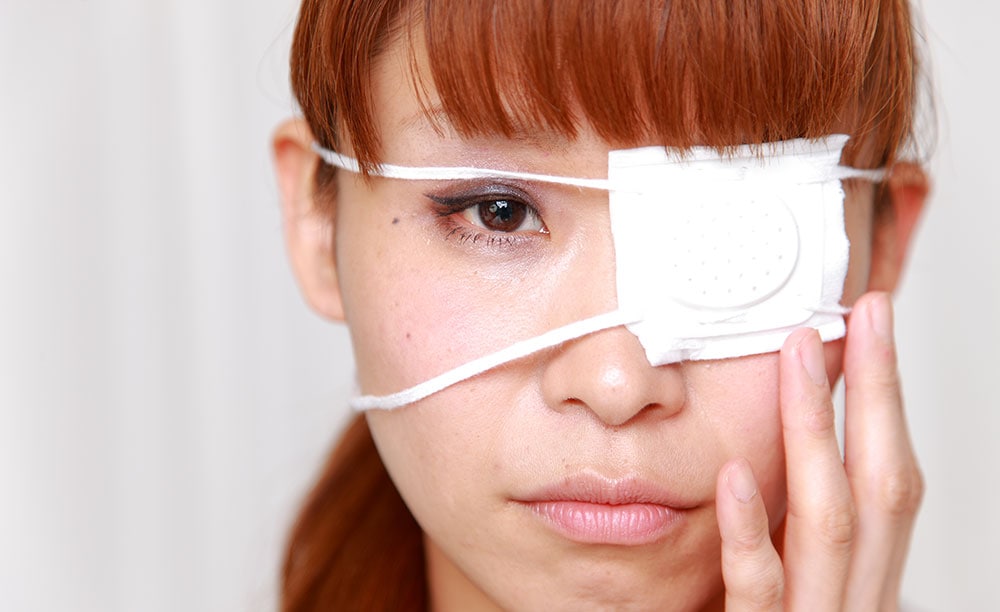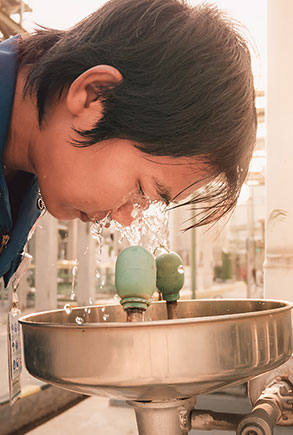
You can’t always tell when an eye is injured or that the injury is serious. Some problems, like a detached retina, can only be seen during a doctor’s examination. And some injuries can raise eye pressure or cause slow bleeding—problems that are only obvious when they get really serious.
Eye injuries can cause vision loss or blindness. It’s important to be able to recognize some of the most common symptoms of eye injuries.
Common causes of eye injuries
- Punches
- Blows from hands, balls, or other sports equipment
- Flying pieces of material from explosions or industrial work
- Flying objects like bullets, darts, fireworks, bungee cords, and BBs
- Chemical splashes
- Protests, riots, or urban warfare
When an eye injury does occur, have an ophthalmologist or other medical doctor examine the eye as soon as possible, even if the injury seems minor at first. DO NOT attempt to treat a serious eye injury yourself.
Eye Injury Symptoms
If you notice any of these signs in yourself or someone else, get medical help right away. These are signs of possibly serious eye injury:
- Ongoing pain in the eye
- Trouble seeing
- Cut or torn eyelid
- One eye does not move as well as the other
- One eye sticks out of the eye socket farther than the other
- The eye has an unusual pupil size or shape
- There is blood in the clear part of the eye
- The person has something in the eye or under the eyelid that tears and blinking can’t remove
Eye Injuries Treatment
Eye Scratches
Many people have scratched their eye at some point, or had their eye scratched by a pet, baby, or home improvement project. Here’s a page all about first aid for eye scratches.
What to Do If You Get Sand or Other Small Particles in Your Eye
Getting sand, dirt, dust, or other small natural particles in your eye is usually not an emergency. Our eyes are very good at flushing out these kinds of particles with tears and blinking. Let your eyes try to take care of the particles naturally before doing anything else.

If you’ve gotten metal, glass, or other man-made materials in your eye, that can be more serious. These kinds of objects can become embedded in the surface of the eye and cause ongoing irritation and more damage.
- DO NOT rub the eye.
- Blink several times and allow tears to flush out the particle.
- Lift the upper eyelid over the lashes of your lower lid to let the eyelashes try to brush the particle out.
- Use eyewash, saline solution, or running tap water to flush the eye out.
- See a doctor or go to the emergency room as soon as possible if you can’t get the particles out of your eye or if it still feels like there’s something in your eye after you’ve gotten the material out.
If You Get Hit in the Eye
- Gently apply a small cold compress to reduce pain and swelling.
- Don’t use steaks or other food items; these can get bacteria into the eye.
- DO NOT apply any pressure.
- If a black eye, pain, or visual disturbance occurs even after a light blow, immediately contact your ophthalmologist or emergency room. Even a light blow can cause a significant eye injury, like a retinal detachment.
If Your Eye Has Been Cut or Punctured
- Gently place a shield (protective cover) over the eye. The bottom of a paper cup taped to the bones surrounding the eye can serve as a shield until you get medical attention.
- Do not press the shield against the eye.
- DO NOT rinse with water.
- DO NOT remove any objects that are stuck in the eye.
- DO NOT rub or apply pressure to the eye.
- Don’t take aspirin, ibuprofen, or other non-steroidal, anti-inflammatory drugs. These drugs thin the blood and may increase bleeding.
- After you have finished protecting the eye, get emergency medical help.
Chemical Eye Injury
- Immediately flush the eye with plenty of clean water.
- Seek emergency medical treatment right away.
- Look for information on the chemical that got into the eye as some chemicals cause more eye damage than others.
For All Other Eye Injuries
Injuries other than grit in the eye or small scratches to the eye should be considered potentially serious.
- DO NOT touch, rub, or apply pressure to the eye.
- DO NOT try to remove any objects stuck in the eye.
- Do not apply ointment or medication to the eye.
- Over-the-counter eye drops can be more painful or make the injury worse.
- Prescription medications should only be used for exactly the condition they were prescribed for, not for emergency treatment.
- See a doctor as soon as possible.
- If you can’t get to an ophthalmologist right away, go to the emergency room.
Why Choose Assil Gaur Eye Institute for your eye care?
The doctors at AGEI offer world-class eye care and vision correction, specializing in emergency eye care, LASIK vision correction, treating cataracts, glaucoma, and a wide variety of cornea and retinal conditions, to name a few. At AGEI, you will experience state-of-the-art medical facilities that bring together revolutionary technologies with experienced ophthalmologists. Our goal is to help you achieve your personal best vision.
Please call 866-945-2745 or visit us here to make an appointment online if you are experiencing any concerning symptoms to determine the best time to schedule an exam.
At AGEI we take our patients’ safety seriously. That’s why our facility’s Covid-19 patient safety procedures exceed all CDC recommendations.
We are conveniently located throughout Southern California and the Los Angeles area. Our ophthalmologists are available at locations in or near Santa Monica and Beverly Hills. We are conveniently located near West Los Angeles, Culver City, West Hollywood, Downtown Los Angeles, Marina del Rey, Pacific Palisades, Malibu, Manhattan Beach, Sherman Oaks, and Encino, to name a few.
- Why Does Pregnancy Cause Blurry Vision? Should I Be Worried? - 04/18/2023
- Eye Disease from Diabetes: A Leading Cause of Blindness - 01/09/2023
- Could these eye drops replace reading glasses? - 04/04/2022













